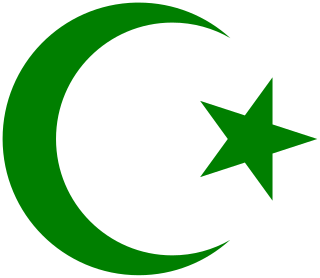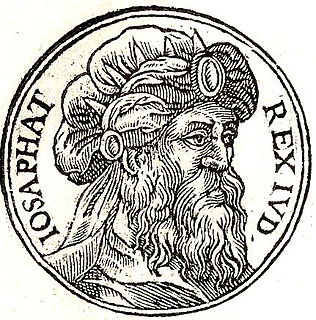This page is based on this
Wikipedia article Text is available under the
CC BY-SA 4.0 license; additional terms may apply.
Images, videos and audio are available under their respective licenses.

Jehu was the tenth king of the northern Kingdom of Israel since Jeroboam I, noted for exterminating the house of Ahab at the instruction of Jehovah. He was the son of Jehoshaphat, grandson of Nimshi, and possibly great-grandson of Omri. His reign lasted for 28 years.

Baasha was the third king of the northern Israelite Kingdom of Israel. He was the son of Ahijah of the Tribe of Issachar. Baasha's story is told in 1 Kings 15:16-16:7.
The non-canonical books referenced in the Bible includes pseudepigrapha, writings from Hellenistic and other non-Biblical cultures, and lost works of known or unknown status. By the "Bible" is meant those books recognised by most Christians and Jews as being part of Old Testament as well as those recognised by Christians alone as being part of the Biblical apocrypha or of the Deuterocanon.
Hananiah, Hanina, Chaninah, Haninah, Chananiah or Ananias may refer to:
The Book of Nathan the Prophet and the History of Nathan the Prophet are among the lost books of the Tanakh, attributed to the Biblical prophet Nathan. They may be the same text, but they are sometimes distinguished from one another. No such text is found anywhere in the Tanakh, so it is presumed to have been lost or removed from earlier texts.
The Story of the Book of Kings is one of the Lost books of the Old Testament. The book is described in 2Chronicles 24:27. The passage reads: "Now concerning his sons, and the greatness of the burdens laid upon him, and the repairing of the house of God, behold, they are written in the story of the book of the kings. And Amaziah his son reigned in his stead."
The Prophecy of Ahijah is a lost text that may have been written by the Biblical prophet Ahijah. The book is described in 2Chronicles 9:29. The passage reads: "Now the rest of the acts of Solomon, first and last, are they not written in the book of Nathan the prophet, and in the prophecy of Ahijah the Shilonite, and in the visions of Iddo the Seer against Jeroboam the son of Nebat?"

In Christianity the figures widely recognised as prophets are those mentioned as such in the Old Testament and the New Testament. It is believed that prophets are chosen and called by God.
Jehu son of Hanani was a prophet mentioned in the Hebrew Bible, who was active during the 9th century BC.

Islamic holy books are the texts which Muslims believe were authored by God via various prophets throughout humanity's history. All these books, in Muslim belief, promulgated the code and laws that Allah ordained for those people.

The Book of the All-Virtuous Wisdom of Yeshua ben Sira, commonly called the Wisdom of Sirach or simply Sirach, and also known as the Book of Ecclesiasticus or Ben Sira, is a work of ethical teachings, from approximately 200 to 175 BCE, written by the Jewish scribe Ben Sira of Jerusalem, on the inspiration of his father Joshua son of Sirach, sometimes called Jesus son of Sirach or Yeshua ben Eliezer ben Sira.

The Scrolls of Moses are an ancient body of scripture mentioned twice in the Quran. They are part of the religious scriptures of Islam, although now they are believed to have been corrupted or lost. These scriptures are understood by Muslims to refer not to the Torah, the main Book of Law which Moses was given, but to an ancient text, which contained some of the inspired revelations which Moses received over his years of prophecy, which were then written down by Moses himself as well as his followers.
The 48 prophets and seven prophetesses of Judaism, according to Rashi. The last Jewish prophet is believed to have been Malachi. In Jewish tradition it is believed that the period of prophecy, called Nevuah, ended with Haggai, Zechariah, and Malachi at which time the "Holy Spirit departed from Israel".
Haim Hanani was a Polish-born Israeli mathematician, known for his contributions to combinatorial design theory, in particular for the theory of pairwise balanced designs and for the proof of an existence theorem for Steiner quadruple systems. He is also known for the Hanani–Tutte theorem on odd crossings in non-planar graphs.

Hosea 1 is the first chapter of the Book of Hosea in the Hebrew Bible or the Old Testament of the Christian Bible. This book contains the prophecies spoken by the prophet Hosea son of Beeri, especially the spiritual whoredom of Israel set forth by symbolical acts. It is a part of the Book of the Twelve Minor Prophets.
Dr Thomas John Jehu FRSE FGS was a British physician and geologist. The Jehu-Campbell Fossil Collection at the University of Edinburgh was donated by Jehu in combination with Robert Campbell and is now the main component of their “Highland Border Series” of fossils. A large number of the fossils come from the Aberfoyle area.
Jehu is the tenth king of the northern Kingdom of Israel, according to the Bible.







